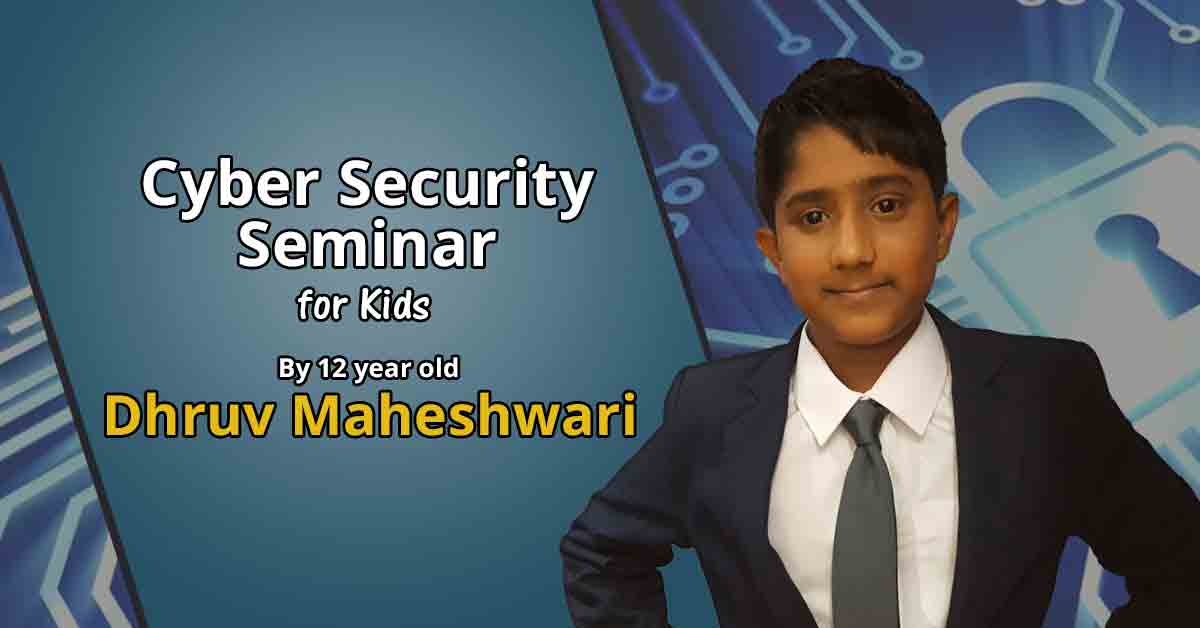12-Year-Old Offers Cyber Security Seminar for Kids in Glasgow: 25th Feb 2018 from 2 to 4pm
Dhruv Maheshwari is a 12-year-old Cyber Security Certified lad and the youngest such certified chap in Scotland.
His series of cyber security and IT videos can be viewed on the British Youth International College YouTube channel. Here is a link for his videos on cyber security:
In his upcoming seminar on 25th Feb 2018 from 2 to 4pm @Community Central Hall in Mayhill (292-316 Mayhill Rd, Glasgow G20 7YE), Maheshwari will be discussing aspects of the following topics
- Using strong passwords for email and social media accounts
- Staying safe from spyware threats using specific security solutions
- Keeping operating systems and computer applications up-to-date
- Using standard user accounts in Windows
- UAC (user account control) best practices
- Using a secure browser when online
- Public and free wi-fi trust issues
- Checking links before clicking
- Logging out after finishing with an application or webpage
- Not posting private information on social media accounts.
This astounding young lad shows an uncanny aptitude for cyber security well in advance of his age. He certainly has a bright future in the field, and he may very well prompt other young people to go into the cyber security industry through his seminars and videos.
What Kids Can Learn
Make no mistake; Dhruv Maheshwari’s videos and cyber security seminars are not filled with fluff. His presentation may not be as polished as an adult speaker who has been presenting for many years, but his knowledge is spot on. Maheshwari teaches kids about:
- online security and privacy
- recognising the difference between legitimate and scam e-mails
- how to communicate more securely via e-mail
- avoiding accidental data leakage
- password security and generating passwords that are easy to remember
- methods for safely browsing the web and simultaneously reducing risks.
All the principles listed above are considered fundamentals of cyber security classes for kids. Interestingly enough, none of them require a university degree to understand. If the average e-mail and internet user was fluent in the six principles, scammers and hackers would have a much more challenging time doing what they do. As things now stand, they rely heavily on user ignorance to proliferate their online attacks.
Practical Education for Young Audience
It may seem odd to adults that a 12-year-old would be offering a seminar cyber security classes for kids. However, just taking a few minutes to watch one of Maheshwari’s videos makes it obvious as to why this young lad is the obvious choice. In addition, he offers practical education for a young audience in language they understand. And because he is young himself, his presentation is not intimidating to his peers.
One of Maheshwari’s more recent videos published over the summer talks about the need for an extra layer of defense to protect against malware. To clarify, malware is malicious software surreptitiously installed on a computer for the purposes of gathering information, gaining unauthorised access, or disrupting normal computer operation. That is to say, it is a great video.
Knowledge Sharing
Maheshwari’s knowledge of cyber security goes well beyond just malware. Certainly, he is intimately familiar with everything from e-mail scams to wi-fi security to maintaining secure networks. Subsequently, he will continue learning as he grows and studies, but for now he already has a tremendous amount of knowledge he can share with other kids.
Dhruv Maheshwari is a bright spot in the global war against cyber threats. In the same vein, governments and non-profit agencies the world over should be doing more to promote the knowledge he has gained among young people. After all, today’s young people will be the cyber security experts of tomorrow. The better job we do at educating young people about coding & cyber security today, consequently, the better equipped they will be to handle tomorrow’s evolving threats that we do not even know about yet.




